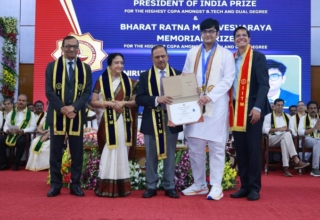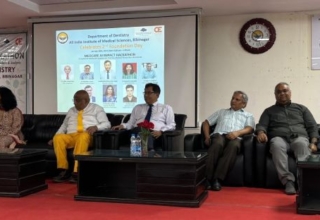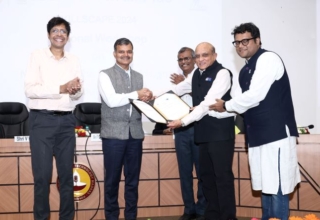
By: Shobha Mishra Ghosh, Asst. Secretary General, FICCI

In the current scenario, India has become the second largest market for e-learning after the US. Users of online education in India are expected to reach 9.5 million by 2021 from 1.9 million in 2017-18. With the current outbreak these estimates will overpass all such estimates.
On its part, FICCI, under the ambit of FICCI ARISE has been facilitating ‘Virtual Meets’ in collaboration with Google India that aim to support schools through providing distance learning solutions, trainings, and resources
The last few weeks have witnessed unprecedented situation where multiple sectors have been affected. The service sector in India employs 32% of the workforce while contributing 55% of national GDP. This is where the effect of the pandemic has been most devastating. Heightened awareness of the threat from the outbreak of COVID-19 (coronavirus) has hugely impacted two of the most important social sectors- Education and Skill Development.
Educators, administrators, training organisations, service providers, parents and students around the world are feeling the extraordinary ripple effect of the crisis as educational institutions and training centres shut down amid the public health emergency. In a matter of weeks the spread of virus has changed how students and youth are educated and trained around the world. Those changes have given us a glimpse of how education could change in the long term. On the demand side, ILO report says that coronavirus pandemic could trigger a global economic crisis and destroy up to 25 million jobs around the world if governments do not act fast to shield workers from the impact.
Schools around the country have been impacted by Covid-19, facing closures that could last for several weeks. The structure of schooling and learning, including teaching and assessment methodologies, was the first to be affected by these closures. With ICT infrastructure not being uniformly pervasive in India across regions and types of schools, only a small percentage of schools are equipped to provide access to online education. The low-income private and government schools have completely shut down due to lack of e-learning resources. Additionally, students have no longer access to mid-day meals during this time and are also subject to socio-economic problems.
We all agree that within a matter of weeks, the outbreak has changed how students are educated around the world. These changes have given us a glimpse of how school education could change in the long term. Personally, I believe that in the changed scenario the two most important elements that would play a crucial role are- Technology and Teacher. To ensure continuity in learning, most of the Schools are transitioning to online classes and digital learning. Today, it is a new reality that only technology enabled educational institutions can ensure that learning continues by implementing live classes where teachers can continue to take classes from their homes and students can participate in from the comfort of their own homes.
Organisations like Extramarks Education, Khan Academy, Microsoft, Google. Byju’s and many others are already providing their services to various education institutions. In the current scenario, India has become the second largest market for e-learning after the US. Users of online education in India are expected to reach 9.5 million by 2021 from 1.9 million in 2017-18. With the current outbreak I am sure we will overpass all such estimates.
In the current scenario, the Government has also taken proactive measures to promote digital learning so that students can continue their learning by making full use of available Digital/ e-Learning Platforms during the period for which the educational institutions are closed. For Schools programs like Diksha, e-Pathshala, NROER (National Repository of Open Educational Resources) are there. Diksha has more than 80,000 e-Books for classes I to XII created by CBSE, NCERT and States / UT which are available in multiple languages. e-Pathshala is a portal where NCERT has deployed 1886 audios, 2000 videos, 696 e-Books (ePubs) and 504 Flip Books for classes I to XII in different languages. Similarly NROER is a portal has a total of 14527 files including 401 collections, 2779 documents, 1345 interactive, 1664 audios, 2586 images and 6153 videos on different languages.

FICCI has also taken various initiatives. Under the ambit of our school education committee, FICCI ARISE (Alliance for Re-imagining School Education), we have facilitated ‘Virtual Meets’ in collaboration with Google India that aim to support schools through providing distance learning solutions, trainings, and resources. Three ‘Virtual Meets’ have already been conducted in the series that have reached out to about 500 school leaders and educators, from close to 200 schools, across 46 cities, 26 states and three countries, with the goals of shared e-learning solutions. We have also organised a series of webinars covering areas like using technology to deliver lessons, technology usage for assessments, engaging tech- platforms for better learning outcomes etc.
In the current circumstances,simply perpetuating our prescriptive approach to teaching will not hold up in this moment of crisis, which demands from teachers not just to replicate their lessons in another medium, but to find entirely new responses to what people learn, how people learn, where people learn and when they learn use of technology in teaching and learning.Technology cannot just change methods of teaching, it can also elevate the role of teachers from imparting received knowledge towards working as co-creators of knowledge. It is imperative to design capacity building and training programs that empower them to effectively leverage technology and make learning meaningful.
There is a famous saying, “Never lose the opportunity of a crisis”. And in this situation, we don’t simply should look to frantically struggle to restore the status quo but also re-invent our approach towards imparting education. There are things we can learn in the chaos of adapting through this crisis, which has revealed profound disparities in children’s access to quality education. Question arises that what could be the key measures? I suggest the following:
- Open-source digital learning solutions and Learning Management Software should be adopted so teachers can conduct teaching online. The DIKSHA platform, with reach across all states in India, can be further strengthened to ensure accessibility of learning to the students.
- Secondly, inclusive learning solutions, especially for the most vulnerable and marginalized, need to be developed. With a rapid increase of mobile internet users in India, which is expected to reach 85% households by 2024, technology is enabling ubiquitous access and personalization of education even in the remotest parts of the country. Many aspirational districts have initiated innovative, mobile-based learning models for effective delivery of education, which can be adopted by others.
- It is also important to establish quality assurance mechanisms and quality benchmark for online learning developed and offered by e-learning platforms.
- Not just the current pandemic but increased economic competition in industrialized countries is setting up the demand for new types of skills and new forms of professional education & training. Teachers are going to strongest pillar for adopting new pedagogy and hence a robust ‘capacity building’ system is required for the k-12 sector.
- Not just learning but performance assessment systems in education will be required to evolve to allow continuous assessment. Teachers should be trained on new assessments processes as well.
At the end I just want to say that a multi-pronged strategy is necessary to manage the crisis and build a resilient Indian education system in the long term. The current crisis is perhaps challenge of our lifetime. Our own lives will be known for before and after Covid-19. We should all come together to ensure that ‘learning doesn’t stop’.









